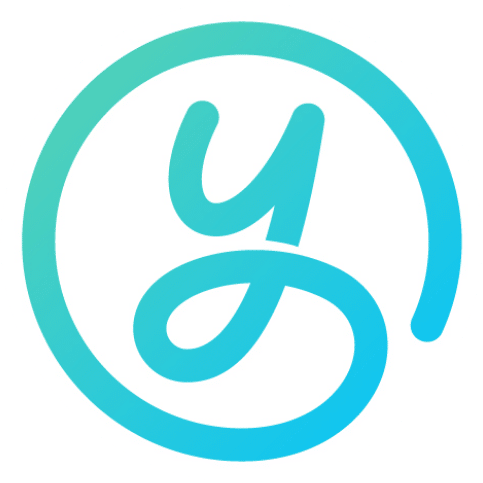If you’re applying to McMaster Health Sciences (BHSc), or you’re simply interested in learning more about the program, this guide is for you.
As a potential applicant, you’re probably overwhelmed by the amount of information out there.
Luckily, we’re here to help.
Here, we’ll break down everything you need to know about McMaster Health Sciences, including the application, deadlines, acceptance rate, program info, common questions, and much more—all in one place.
By the way, if you’re serious about getting into McMaster Health Sciences, our 1-on-1 Youth Coaching services will help you become a stronger applicant, student, and leader. We work on things like improving real-world skills, building self-awareness, and achieving big goals, so you can maximize your post-secondary potential.
Looking for specific guidance on the McMaster Supplementary Application? Visit our McMaster Health Sciences Application Prep Guide for a full breakdown of the McMaster Health Sciences Supplementary Essays, including essay question templates, examples, and more.
Before diving in, check out this video from one of our Youth Coaches about the McMaster BHSc program:
Table of Contents:
- Requirements & Admissions Process: Acceptance rate; Deadlines; Admission averages; and More.
- Application: Supplementary Application questions; Evaluation standards; Level 1 vs. Level 2 applications; and More.
- About the Program: Specializations; Courses; Scholarships; and More.
- Common Questions from Students: Is the program hard?; What is McMaster BHSc’s approach to learning?; and More.
- Program Comparisons: Western Medical Sciences; University of Toronto Life Sciences; McMaster Arts and Science; and More.
McMaster Health Sciences Requirements & Admissions Process
McMaster Health Sciences Acceptance Rate
McMaster Health Sciences receives around 4,200 applications per year, and has an an annual enrolment of 240 students.
Here is all the data we have from 2021:
- ~5,200 total applications
- ~4,000 complete applications
- ~270 offers to fill 240 seats
So, basic math suggests that the McMaster Health Sciences (BHSc) acceptance rate is around 6%, right?
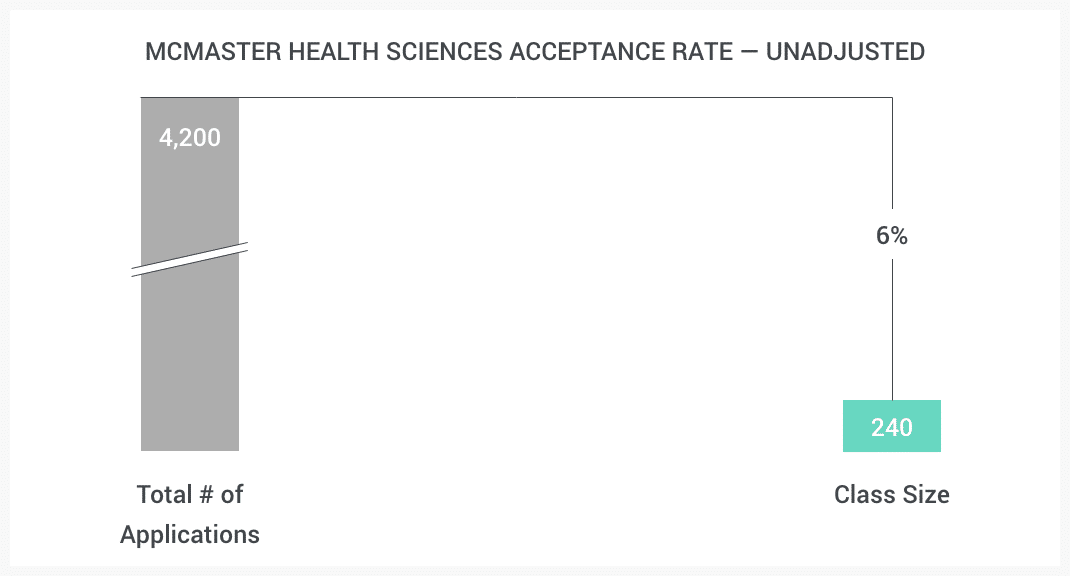
Wrong.
We’re forgetting to apply 2 important things.
The first is adjusting for the acceptance rate calculation for only those who meet the 90% cut-off.
The McMaster Health Sciences cut-off is 90%. Surprisingly, around 3,150 applicants actually meet this grade requirement.
So, what does this mean? If you do meet the cut-off, you’re competing against significantly fewer students.
In fact: Your chances increase to about 8%.
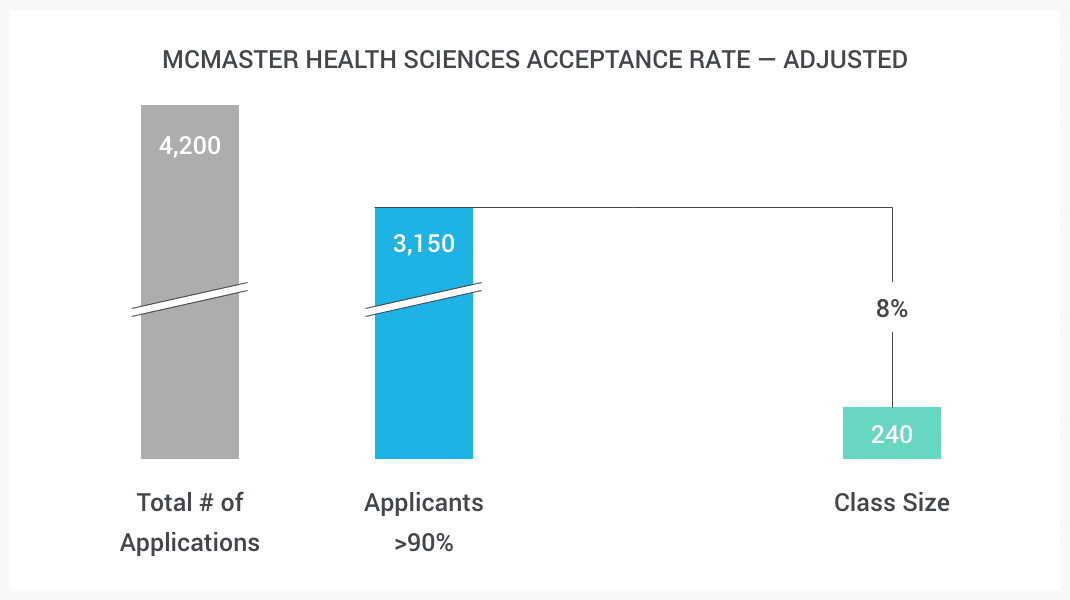
The second adjustment factor we need to make is also important.
You may find it hard to believe, but around 20% of students reject their offer to the McMaster BHSc program.
Approximately 80% of students who receive an offer to McMaster BHSc actually accept it.
This means that the admissions committee has to offer more acceptances than their planned class size of 240, knowing that some will reject the offer.
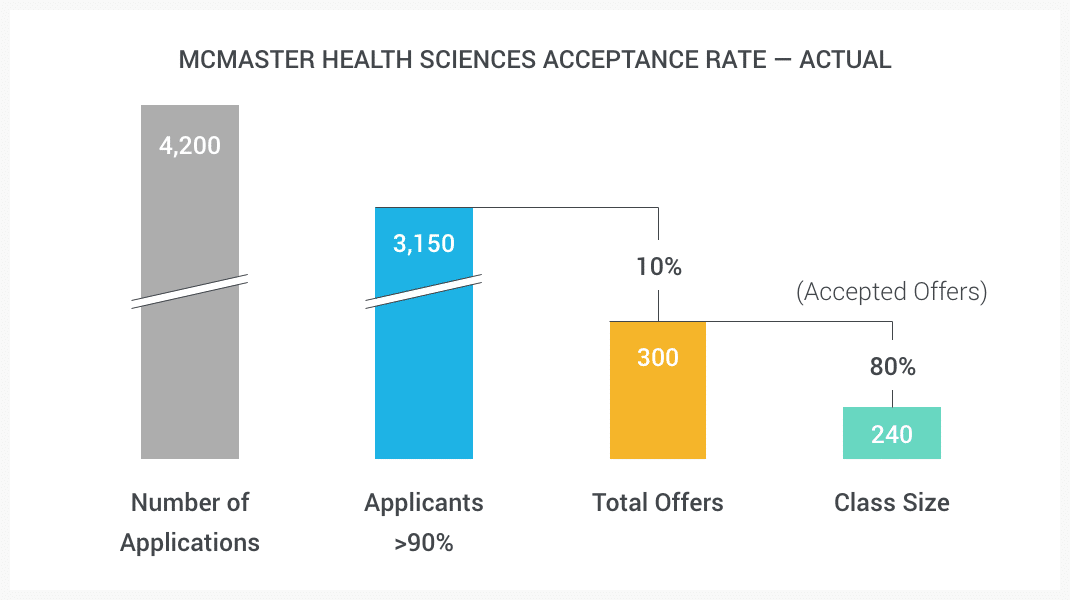
So, what’s the final answer?
The McMaster Health Sciences (BHSc) acceptance rate is approximately 10%.
In other words, if you meet the cut-off you have about a 1 in 10 chance of admission.
Yes, that’s much higher than 6%.
But don’t forget: you’re up against an incredible pool of students.
Want to get an edge on your competition? One of the ways you can do this is by creating unique unique Supplementary Essays that showcase your problem solving, critical thinking, and communication skills. Check out our 1-on-1 Youth Coaching services to learn how.
McMaster Health Sciences Application Deadline
LEVEL 1 APPLICANTS:
The OUAC 101 deadline for Level 1 applicants (program code MNS) is January 15, 2025.
Once you’ve applied through OUAC, you’ll get an email telling you how to access the McMaster Health Sciences Supplementary Application, along with the deadline.
- McMaster BHSc Supplementary Application Instructions Email (Level 1): 31 January 2025
- McMaster BHSc Supplementary Application Portal Access (Level 1): 3–6 February 2025
McMaster Health Science acceptances will be made in May 2025.
For more information about deadlines and application instructions for Level 1 Applicants, visit this page.
LEVEL 2 APPLICANTS:
If you are enrolled as a student at McMaster University, the internal Mosaic transfer deadline is April 29, 2025. If you are transferring from another university, the OUAC application deadline is April 1, 2023.
The Supplementary Application deadline is based on when McMaster allocates you a time slot via email (along with your username/password). Once you receive this information, you can add your answers to their online portal (dates below). You will have approximately three days to add your answers to McMaster’s system (dates below).
- McMaster BHSc Level 2 Supplementary Application Instructions Email: 5 May 2025
- McMaster BHSc Level 2 Supplementary Application Portal Access: 6–7 May 2025
Final transcripts must be submitted to McMaster University’s Admissions Office by June 1, 2025.
Always remember to check the Registrar’s website, as well as McMaster Health Sciences’ program page for important application dates.
For more information about deadlines and application instructions for Level 2 Applicants, visit this page.
We know this process is confusing, but just remember — you don’t have to do this alone! We always have your back. If you need support, connect with a Youth Coach.
McMaster Health Sciences Acceptance Dates
When you’ve submitted your application, the waiting begins.
You might be wondering when McMaster Health Sciences sends their acceptance letters.
According to the BHSc website, acceptances are sent out in early May.
Here is what a letter of admission to McMaster Health Sciences looks like (it’s what we received!):
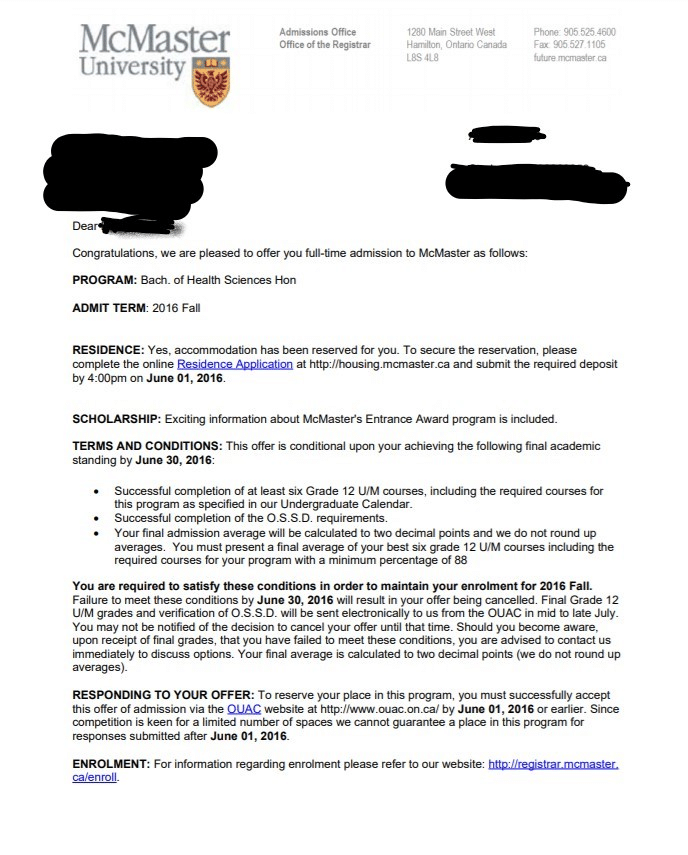
We know it’s tough, but try to be patient — it’ll pay off in the end!
McMaster Health Sciences Admissions Timeline
Here’s what the admissions timeline looks like, so you know what to expect:
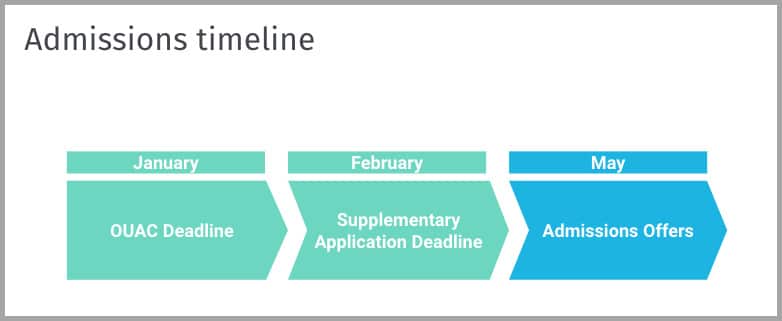
McMaster Health Sciences Admission Decision
Your application goes on a long journey from the time you submit it to the time it gets accepted.
Here’s a breakdown of the admissions process so it’s easier for you to visualize:
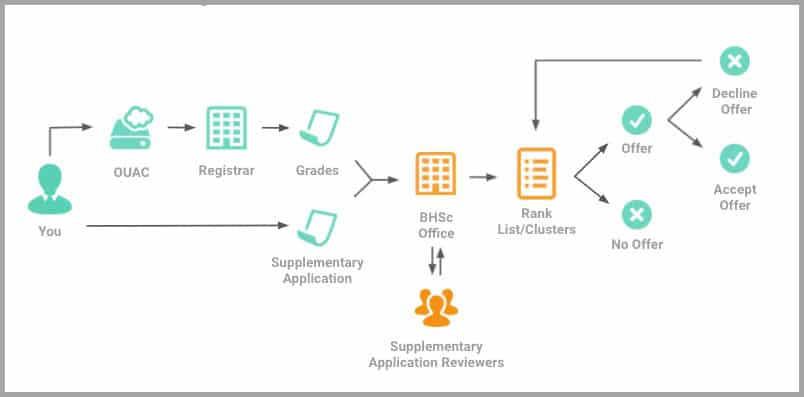
McMaster Health Sciences Admission Offers
You’re probably wondering how admission offers are made by McMaster Health Sciences.
Once you’ve submitted your application and it’s gone through the process as outlined above, the McMaster BHSc admissions committee uses a unique clustering process where they create a rank list of applicants according to their Supplementary Application scores.
Next, applicants are put into groups based on a percentile of their Supplementary Application score (ex. 95th+ percentile, 90-94th percentile, etc.). Depending where you are in the list, the percentile shows what percentage of students got a Supplementary Application score either equal to or below your score.
From here, a grade average cutoff is set by the program to determine who receives offers of admission from each percentile cluster. If you meet that cutoff, you will receive an offer. The cutoffs vary year to year.
Here’s what this process looks like to help make it a bit easier to understand:
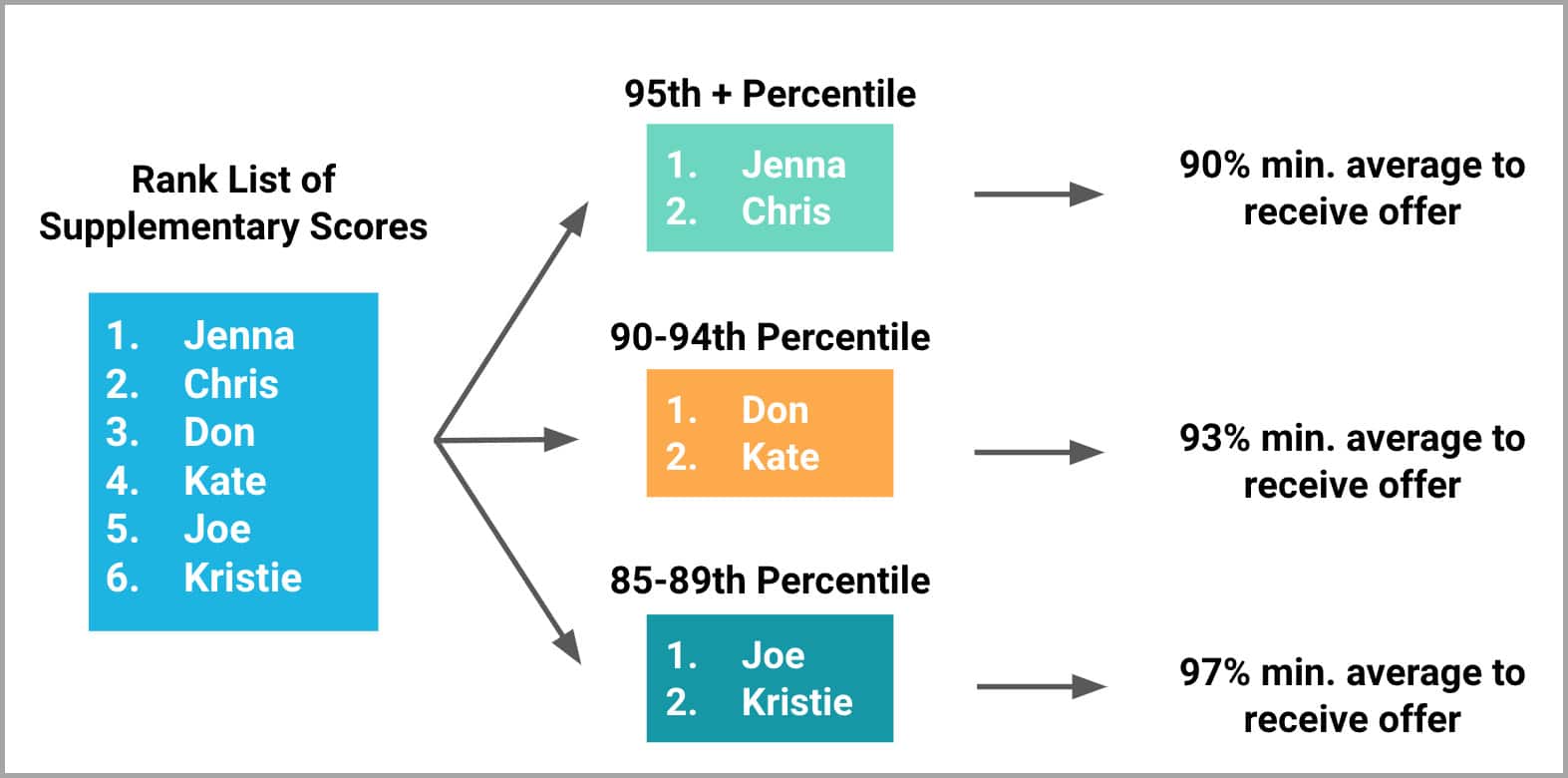
If you have a really high Supplementary Application score, you can get away with a lower grade.
This means that your Supplementary Application can mean the difference between admission success and failure. If you want to increase your chances of admission by creating a standout Supplementary Application, connect with a coach today.
You Might Also Like
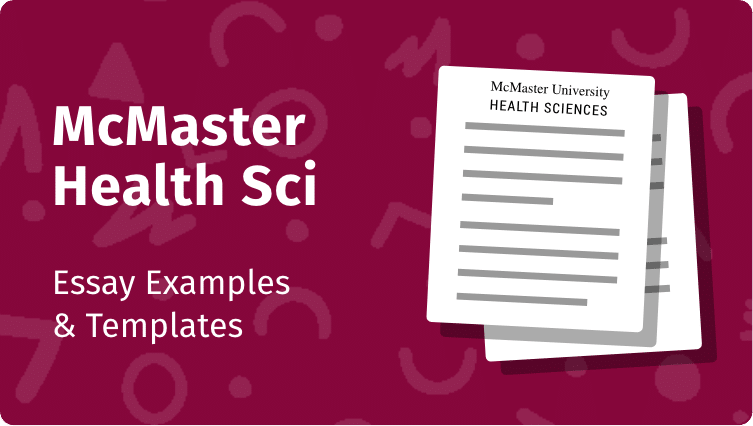
Application Prep
McMaster Health Sciences: Supplementary Application Essay Examples & Templates 2024/2025
If you are looking for guidance on the McMaster Health Sciences (BHSc) Supplementary Application, as well as essay examples and… Read more
McMaster Health Sciences Prerequisites Requirements
Applicants can either apply to Health Sciences directly from high school (Level 1 Applicants) or after first year of undergrad (Level 2 Applicants).
LEVEL 1 APPLICANT REQUIREMENTS:
To qualify for BHSc Level 1 admission, the prerequisites (prereqs) are:
You must have a minimum 90% average in the mandatory Grade 12 U/M level courses (listed below), plus 1 additional course of your choice (6 courses in total).
- ENG4U (English)
- One of MHF4U (Advanced Functions), MCV4U (Calculus and Vectors), or MDM4U (Data Management)
- SBI4U (Biology)
- SCH4U (Chemistry)
- One non-math; non-science; non-technology 4U/M credit (search acceptable courses)
To make sure that your Grade 12 courses meet McMaster Health Sciences’ requirements, visit this page.
You also need to complete a Supplementary Application. Applications without a Supplementary Application will be automatically excluded. You will have approximately 3 days to enter your answers into McMaster’s system. The Supplementary Application is due early- to mid-February. Keep reading for a full overview of the McMaster BHSc Supp App.
For more information about how to apply to Health Sciences Level 1, visit this page.
LEVEL 2 NON-MCMASTER APPLICANT REQUIREMENTS:
To apply to McMaster Health Sciences as a Level 2 applicant, you can complete 1 full year of university undergraduate studies. If you have completed more than 1 year, you are NOT eligible to apply.
The OUAC application is due April 1, 2025.
Of the 240 spots open for new students, 20 are open for Level 2 transfer students.
Didn’t get into Health Sciences straight out of high school? Good news! This is your chance to apply again after your first year of university!
Here are the McMaster Health Sciences Level 2 admission requirements for applicants from a university other than McMaster:

Level 2 applicants must also submit a Supplementary Application. Applications without a Supplementary Application will be automatically excluded.
Your final transcript must be submitted to McMaster by June 1, 2025.
LEVEL 2 MCMASTER TRANSFER STUDENTS REQUIREMENTS:
If you are currently enrolled as a student of McMaster University, you will apply through Mosaic.
While the application is available in April, make sure you check the McMaster’s Future Students website for important dates.
The requirements for McMaster Level 2 Applicants is the SAME as those for Level 2 transfer students from outside McMaster (see the table above).
The Supplementary Application deadline is based on when McMaster allocates you a time slot to add your answers to their online portal (it will likely be sometime in mid/late May).
For more information about how to apply to Health Sciences Level 2, visit this page.
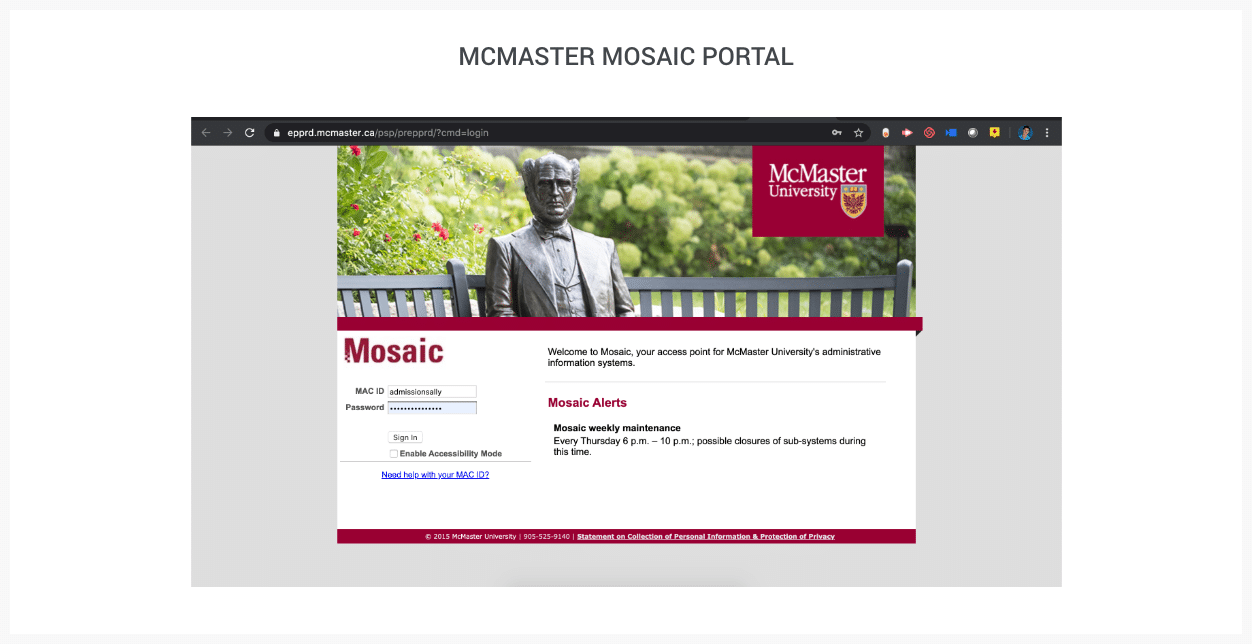
IN-PROVINCE APPLICANTS VS. OUT-OF-PROVINCE/INTERNATIONAL APPLICANTS:
As an out-of-province or international applicant, you will be held to the same requirements as other Level 2 Applicants. The specific requirements are available on this page.
Need some help making sure you meet all of McMaster’s requirements? Connect with a coach for support or contact us at: help@youthfully.ca.
McMaster Health Sciences Entrance Average
Unfortunately, McMaster does not publish this data.
According to the McMaster Health Sciences website, students should finish Grade 12 with at least a 90% average to be competitive for admission into Health Sciences.
We are told that approximately 88% of the seats go to students with an average of 94% or more.
To determine your entrance average from your top 6 courses, McMaster will take your first semester final marks along with your midterm marks from your second semester
REMEMBER: Your Grade 11 marks are never seen by the BHSc office because they do not make early admission offers.
Number of Applications to McMaster Health Sciences
In 2020-2021, McMaster Health Sciences received approximately 5,200 applications (4,000 of which were complete applications).
Long-term data trends are somewhat difficult to determine. OUAC groups McMaster’s application data into sciences, and doesn’t split out Health Sciences as a distinct program.
However, we did some digging and McMaster’s application data in the early 2000s (and interestingly splits it out between rural and non-rural Ontarians). We also obtained data quoted by admissions offers (e.g. Ghazaleh Ferdowsi)
We ran a bit of interpolation/extrapolation to find application trends.
In short: applications are growing around 5% year-over-year.
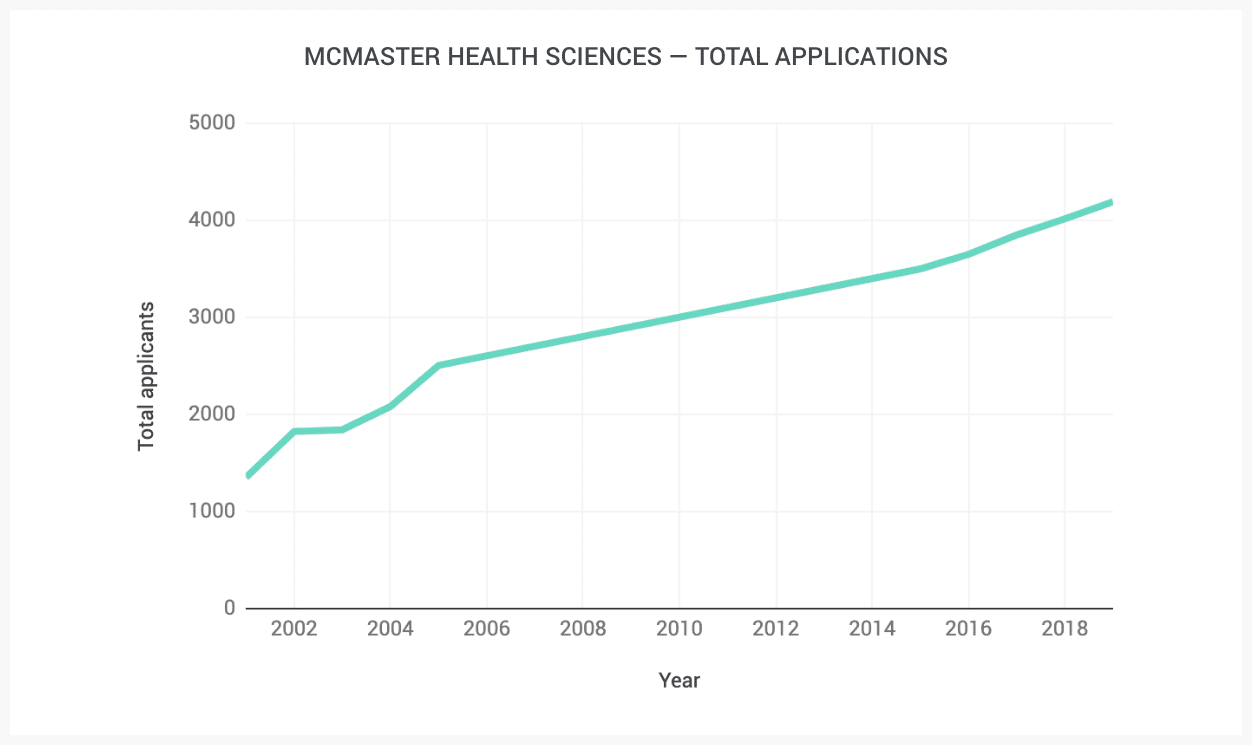
Since this is a popular pre-med program, approximately 90% of admitted applicants are from Ontario.
McMaster Health Sciences Early Acceptance
McMaster Health Sciences does NOT offer early enrolment or early acceptances.
As mentioned, applicants are required to complete their Supplementary Applications by mid/late February.
Then, all acceptance letters are sent out at the same time, typically in early May of each year.
McMaster Health Sciences Class Size / Enrolment
McMaster Health Sciences aims for a class size of 240 first year (Level 1) students each year.
However, there is attrition after the first year — students either realize the program isn’t for them or they don’t keep their marks up.
That’s why they make another 20 spots available for Level 2 transfers (current university students).
Ace your McMaster BHSc Supp App.
get a youth coach™Simrit
Mac BHSc
Grad & Youth
Coach™

McMaster Health Sciences Application
This section provides a general overview of the application process and answers the most popular questions we receive about the application itself.
If you have any questions about application strategies, essay tips, and past video interview questions, and you want to learn ways to help you get accepted, connect with a coach now.
McMaster Health Sciences Supplementary Application Questions
Many students reach out to us every year about the McMaster Health Sciences Supplementary Application questions.
First, let’s cover what this application is and why they ask you to write one.
The purpose of the Supplementary Application is to allow you to share more about yourself, beyond your high school grades.
Here, you can showcase your experiences, interests, skills, thought processes, writing abilities, and other qualities. Doing this will help your reviewers understand who you are and decide if you will make a good addition to their program.
Level I and Level II applicants complete the SAME Supplementary Application.
The 2024/2025 McMaster Health Sciences Supplementary Application has 2 questions, with 3 options in each question. You must choose 1 option from EACH question (e.g. Question 1B and 2A; Question 1A and 2C; Question 1C and 2C; etc.).
If you’d like to see some examples of questions you can expect, check out these past Supplementary Applications:
- BHSc Supplementary Application 2024/2025 (this year)
- BHSc Supplementary Application 2024/2023
- BHSc Supplementary Application 2022/2023
- BHSc Supplementary Application 2022/2021
- BHSc Supplementary Application 2019/2020
- BHSc Supplementary Application 2018/2019
- BHSc Supplementary Application 2017/2018
These questions can be pretty tough, so we’ve created breakdowns, templates, and examples for EVERY QUESTION to help you ace your McMaster Health Sciences Supplementary Application. Check out our McMaster Health Sciences Application Prep Guide here. Trust us, you don’t want to miss it!
For more guidance on how to approach your Supplementary Application, check out our 1-on-1 Youth Coaching Services by McMaster BHSc grads and former Supplementary Application reviewers!
McMaster Health Sciences Supplementary Application Evaluation
A lot of students ask us how the McMaster Health Sciences Supplementary Application is evaluated. Here’s what we know:
WHO READS THE APPLICATIONS?
Every year, faculty, staff, and fourth year BHSc (Honours) students review and evaluate the applications. Fourth years may opt out of grading the applications, but most do not.
The distribution of applications is random, so you will never know exactly who evaluated it. However, the chances are high that it will be a mix of faculty, staff, and fourth year students.
2 people grade each response on your application. If there is a significant discrepancy in the scores given for a single response, it will be evaluated by another person.
HOW ARE MCMASTER HEALTH SCIENCES APPLICATIONS EVALUATED?
You might be asking, “How can I get accepted to McMaster Health Sciences? This program is so competitive!”
Although it might seem like getting into this top-tier is almost impossible, understanding exactly what the admissions committee is looking for can help you create the best essays possible.
Supplementary Applications are important because they show the evaluators who you are, beyond the 90% cut-off average.
McMaster BHSc gets thousands of applications every year. Because of this, the reviewers tend to pay more attention to essay answers that are communicated well, provide a ton of personal insight, and are memorable, unique, and authentic.
Not sure how to incorporate all these things into your application? Check out our McMaster Health Sciences App Prep Guide to learn about creating a unique application that gets noticed. We also developed an effective communication approach to help your answers stand out from the crowd.
Each question in your Supplementary Application is evaluated separately. All evaluators are blinded to applicant identifiers (e.g. name, age, race, gender, etc.). Your reviewers will see 1 response at a time, and they usually spend around 45 seconds – 60 seconds on each response (each reviewer reads a maximum of 300 responses).
The reviewers want to see the following things in each of your answers:
- Your answers show self-reflection, personal insight, creativity and/or curiosity.
- Your answers demonstrate thoughtfulness, insight, and/or interest.
- Your answers are unique and compelling and they stand out from the crowd.
- Your answers have something notable and interesting to say, going beyond simplistic or cliche responses.
- Your answers are organized, well written, have no grammatical/spelling errors, and show that you have strong communication skills.
- Your answers clearly show that you’ve invested a lot of time and effort in writing them.
Reviewers take all these elements into consideration and each answer is ranked from 0-7.
Your application’s evaluation depends on this grading scheme, and then your scores are averaged.
Here’s how your Supplementary Application responses are evaluated:
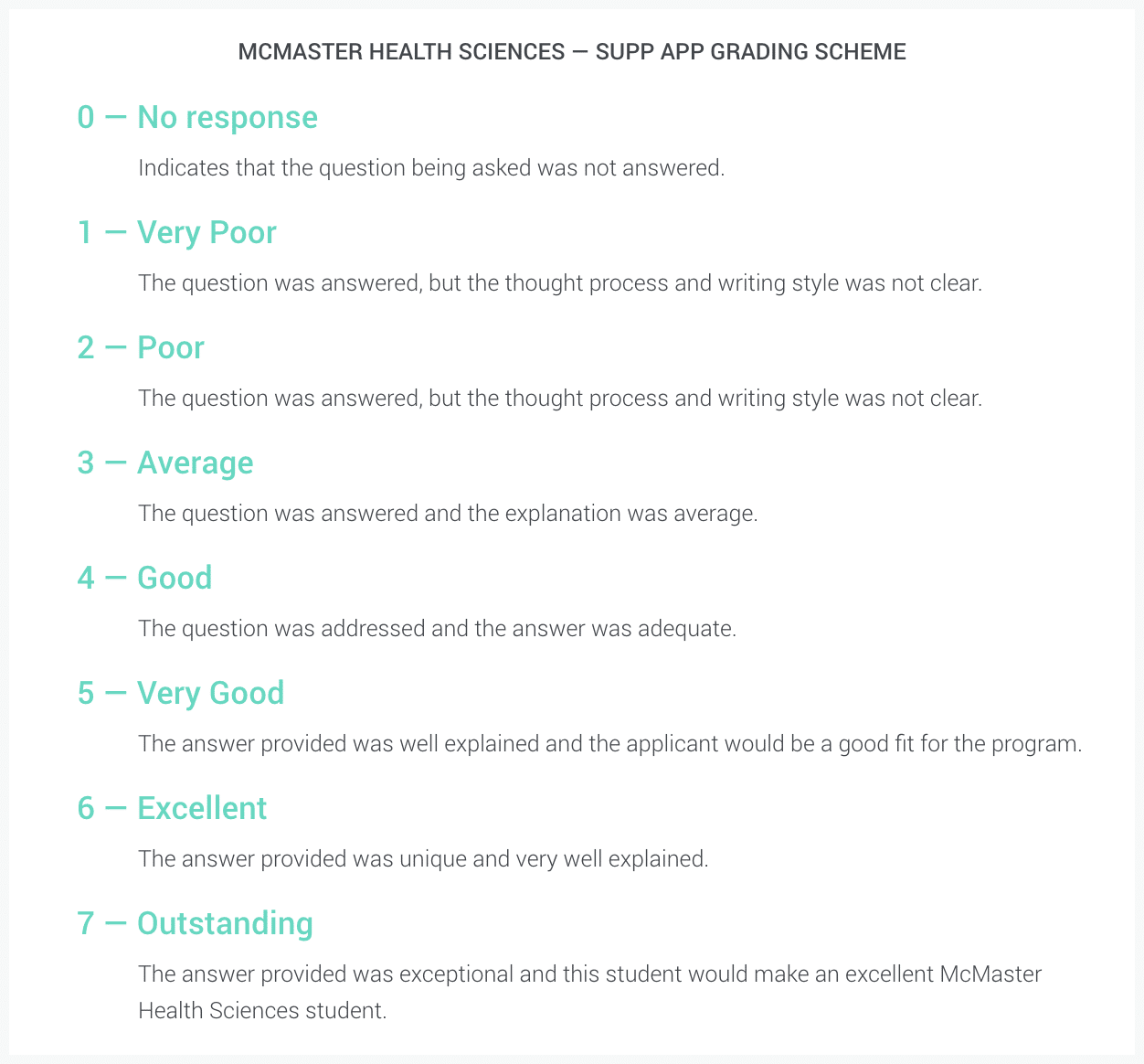
As seen in the chart below, approximately 85% of applicants score below 5 and get an “adequate” or “average” score.
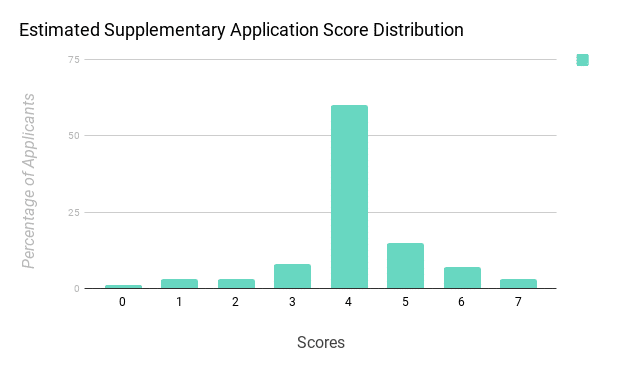
Each reviewer reads your question, gives it a score, and then these scores are averaged for the total Supplementary Application score. Here’s an example of what a Supp App evaluation might look like:
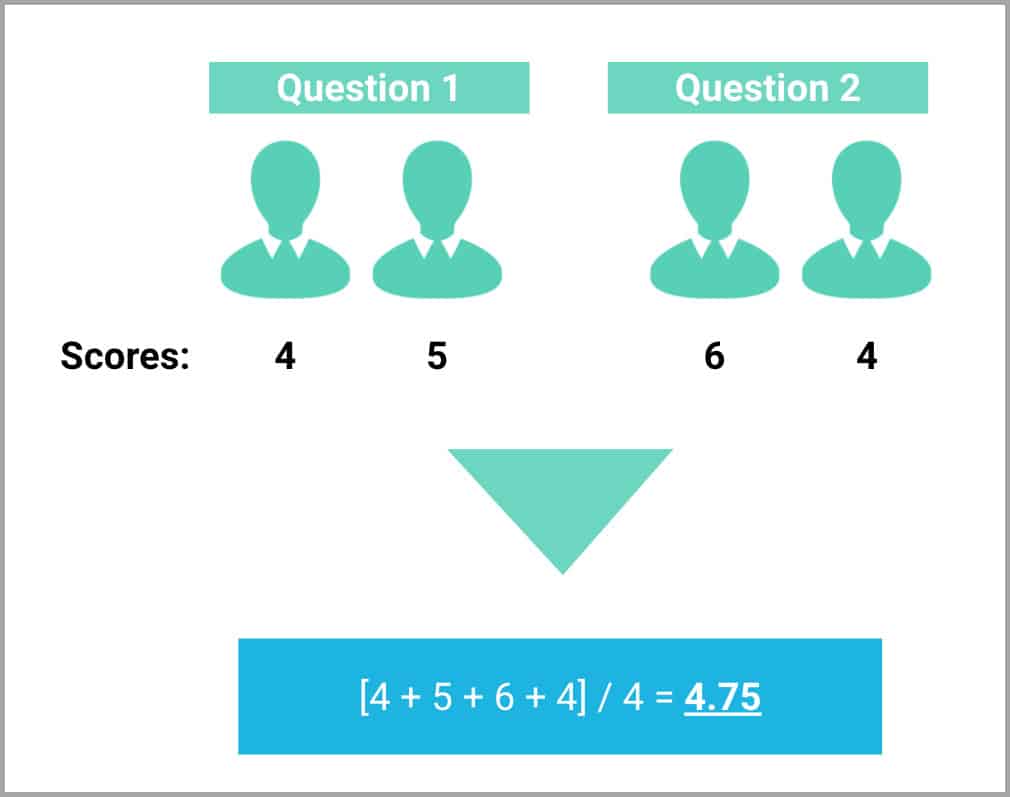
We spoke with around 10 reviewers. All of them said that they gave 4s to 60-70% of responses, and that 5s are more common than 3s.
This means that you can really make your application stand out and get a higher score if you have a high GPA and your Supplementary Application answers are unique and explained well.
To learn how to communicate your ideas in a unique and authentic way and score 6s and 7s on your Supplementary Application, connect with a coach.
WHAT HAPPENS IF THERE IS A GRADING DISCREPANCY?
If 2 evaluators give really different marks (e.g. 1 and 7), then another faculty member will review your response. We’ve been told that this happens when scores are off by 3 or more points (e.g. 7 and 4).
WHAT HAPPENS AFTER THE APPLICATIONS ARE EVALUATED?
Once the applications are reviewed, the scores are sorted from highest to lowest average.
Next, the rank list of Supplementary Application scores are organized into “clusters” based on percentile ranks.
A percentile displays what percentage of applicants received a Supplementary Application score that was equal to or below a certain score. For example, an applicant with a score in the 90th percentile has a score equal to or better than 90% of the applicant pool.
From there, different grade cut-offs are set for each cluster. If an applicant in a cluster meets the grade cut-off set for it, then they receive an offer of admission. If the applicant does not meet the grade cut-off, they do not receive an offer.
For example, applicants with a 95th+ percentile Supplementary Application score may need to just have a 90% average to get an offer, whereas applicants with a 90th-94th percentile score may need to have a 93% average to get an offer of admission.
The exact percentile ranks of the “clusters” or the grade cut-offs set for them are not known, but this is the process that the BHSc Office applies to make admissions decisions.
Because of this, it is possible for a very high Supplementary Application score to compensate for a low 90% average, but it is not possible for a very high average to compensate for a low (3-4) Supplementary Application score.
This is why your Supplementary Application is so crucial.
For example 2019-2020, a 93% average, along with a 95th percentile Supplementary Application score, was required to get an offer. No applicants with less than an 85th percentile Supplementary Application score received an offer.
What is McMaster Health Sciences Looking For?
McMaster Health Sciences is looking for students who are open-minded, can think critically, and will embrace the BHSc’s inquiry-based, interdisciplinary style of learning.
Telling your evaluators more about yourself can also help increase your chances of admission.
Highlight your life experiences, extracurriculars, and hobbies and show off your critical thinking and problem solving skills with unique and thought-provoking answers.
Many make the mistake of believing that the only valuable experiences are in healthcare and research. This isn’t the case.
Whether you have volunteered in a soup kitchen or animal shelter, or teach piano on the weekends, there is no such thing as an insignificant experience—they make you who you are.
Check out our McMaster Health Sciences Application Prep Guide for a full breakdown of what McMaster’s evaluators are looking for and how you can create memorable and unique essays that stand out from the crowd.
For more guidance on how to approach your Supplementary Application questions, work with a former BHSc supplementary application reviewer through our 1-on-1 Youth Coaching Services.
You Might Also Like
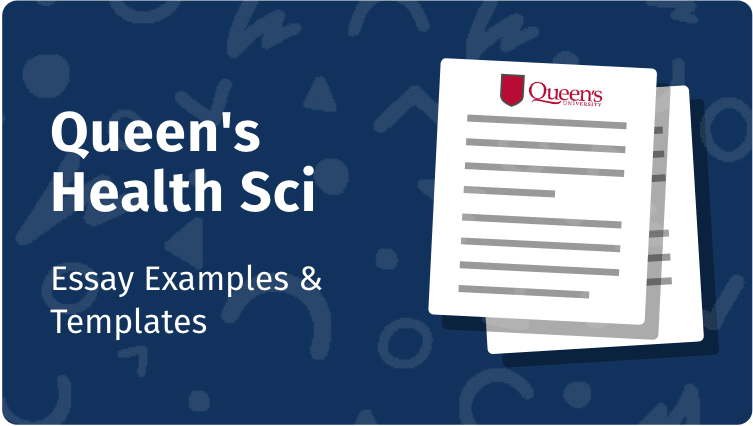
Application Prep
Queen’s Health Sciences: Supplementary Application Essay Examples & Templates 2024/2025
If you are looking for guidance on the Queen’s Health Sciences supplementary application, including application essay examples and templates, then… Read more
Grades vs. Supplementary Applications
A common question we receive is: “What’s more important, grades or Supp App essays answers?”.
To be considered for the program as a Level 1 Applicant, you must have a minimum 90% grade in five of your required courses, plus one additional Grade 12 course.
However, the founder of the program, Del Harnish, believed that marks shouldn’t be the defining feature of your application. He wanted to use an evaluation scheme where you could show your abilities beyond your high schools grades.
For this reason, your Grade 12 marks will be used in combination with your Supplementary Application to determine whether you are a good fit for the program.
This means that, beyond your transcripts, the majority of your chance for admission likely comes from your Supplementary Application.
So, your grades are what can get your foot in the door, while your Supplementary Application is what keeps the door open so you can go through it.
McMaster Health Sciences Supplementary Application Tips
Many students ask us about tips for writing their McMaster Health Sciences Supplementary Application.
We’ve listed the most important ones here.
TIP #1: THINK AHEAD
Start your Supplementary Application early because you will be surprised how long it can take to perfect.
Questions usually come out in September, so you should be thinking about them, drafting responses, and reviewing your answers as many times as you can between then and your February submission timeslot.
TIP #2: BE UNIQUE
Next, find ways to make your application stand out. Evaluators receive many applications every year, and reading the same answers over and over can be frustrating.
To set yourself apart, be creative, think critically, and let your personality shine through.
This can include talking about why you want to attend the program, skills you’ve learned from past experiences and extracurriculars, or finding a unique way of answering the application question (especially by using our Deductive Communication Approach and Narrative Communication Approach).
TIP #3: SHOWCASE YOUR THINKING
You also need to show the evaluators that you have really thought about your responses and you can organize your thoughts well.
Quality, not quantity, is key, so pick one or two unique points and talk about them at length, rather than writing a bunch of random points that are not fully thought through.
For example, the 2019/2020 Supplementary Application question asked applicants to share their thoughts on this piece of artwork:

Many individuals touched on colonialism and our impact on Indigenous populations. While these are good points to discuss, evaluators likely received hundreds of similar answers.
So, how can you set yourself apart in this case?
Approach the prompt from a different angle; discuss the art itself, its imagery, or another theme that stands out to you. This will make the evaluator feel invested in your answer and want to read more.
For more guidance and tips about how to approach your Supplementary Application, check out our 1-on-1 Youth Coaching.
You can also reach out to our Youth Coaches who are former BHSc graduates and Supplementary Application reviewers any time at: help@youthfully.ca
How to Submit the McMaster Health Sciences Supplementary Application
Congratulations! You’ve finished writing your application and it’s time to submit it!
When you’re ready, you’ll receive an email with additional instructions and your username/password to access the online submission portal.
When you have that, go to this link to submit your Supplementary Application.
REMEMBER: You must submit your application before the deadline because there are no extensions. You’ll receive an email from Admissions allocating you to a particular time slot. You will have approximately 3 days to log in and complete the application in the system.
For more information on application deadlines, visit this page.
You CANNOT simply copy and paste your answers, but you must type your answers out manually. Don’t rush this step. Double check your answers for spelling mistakes, grammar, and other errors.
If you have technical problems with your Supplementary Application, submit a ticket to the McMaster BHSc Apply Helpdesk (available in the Supplementary Application submission site). If the Helpdesk does not respond to your inquiry within 2 business days, email: bhsc@mcmaster.ca.
For more information on submitting your Supplementary Application, visit this page.
You Might Also Like
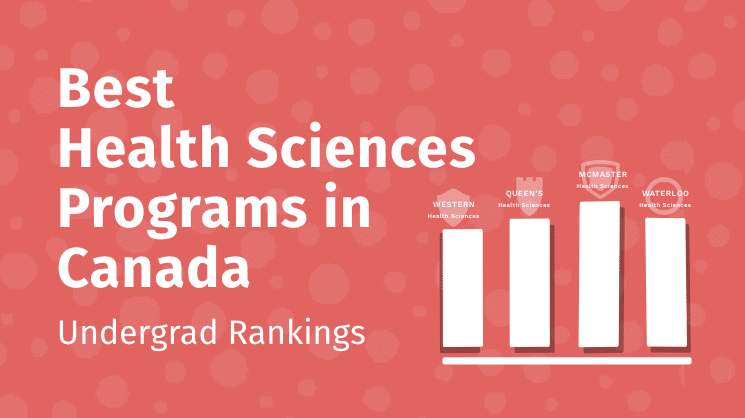
Rankings & Lists
Best Health Sciences Programs in Canada 2024 (Undergraduate)
You’re investing a TON of time, money, and energy towards your future. You’ve gotten the grades, done a bunch of… Read more
About McMaster Health Sciences
Our Advice for Prospective McMaster Health Sciences Students
We get it — starting university is scary.
It’s hard getting used to life as a university student. Many students often compare themselves to others and get stressed out if they don’t feel like they fit in.
No matter how bad it seems, remember that you’ve come too far to throw in the towel.
An important part of attending university is putting yourself out there. Attend a club fair, find a volunteer opportunity, or get more involved in student community initiatives (we highly recommend all of these!).
One thing that a lot of our students tell us is that stepping out of their comfort zone completely changed their experience in the program. Most say that this is how they made friends, took a break from classes, and learned about their interests and career goals.
What’s the best advice we can give you?
Whether it is an assignment, application, or an important interview, it is normal for you to feel stressed, insecure, and frustrated.
The best thing you can do is to keep an open mind and adapt to these new experiences, trust in yourself and others, and ask for help when you need it (we are always here to support you too!).
Just remember: it’s not the destination that is important, it is the lessons that you learn along the way that make the real difference. 🙂
McMaster Health Sciences & Medical School
Many McMaster Health Sciences applicants have the dream of becoming a physician.
Approximately 15-20% of third year BHSc students and 50% of fourth year BHSc students are admitted into medical school each year.
Many students assume that the reason approximately 65%-70% of the program is admitted into medical school is because of grade inflation.
However, we don’t think this is completely true. Why?
First, there are many students with high GPAs who are rejected from medical school every year.
Second, students must have an average of 90% to be admitted to the program, and many of them work hard to maintain the same average throughout university. These students are very driven and focused on succeeding, which in turn leads to their success.
Finally, this program helps you develop important life skills from day one. Communication courses, collaboration opportunities, consistent reflection, and a tremendous emphasis on research all play a significant role in the admission of BHSc students into medical school.
The data we collected shows that many students from McMaster end up attending medical school.
University of Toronto’s MD program reports that most of their 2021 first-year MD students previously attended McMaster (U of T was the runner up), with 58% having completed a 4-year Bachelor’s.
At McMaster Medical School, of the 205 students who were admitted into the class of 2025, 48 of them completed their undergraduate degree in Health Sciences (and 92 in Science).
Queen’s Medical School reports that 75.9% of its 2026 class are Ontario students, many of who presumably went to McMaster Health Sciences.
The University of Ottawa Medical School does not have a readily available class profile, but you can learn more about their admission requirements by visiting this page.
COACH’S TIP: When you start the McMaster Health Sciences program, try to keep an open mind. You may think that you only want to pursue medicine, but over time this could change. You might take an elective that sparks a new passion or find another interest you didn’t know you had. This is totally normal.
If you do decide to pursue medicine, work hard and do your research. But, don’t get caught up in the idea that you must get into medical school in your third year or fourth year.
While the average age for a medical school student is 24, take your time and reflect. Medicine is a lifelong commitment, so you need to be completely sure it’s what you want.
If you are thinking about a career in medicine and wondering how McMaster BHSc can help you get there, reach out to our Youth Coaches or email help@youthfully.ca. As graduates, they can help you with any questions you might have.
McMaster Health Sciences Specializations and Certificates
After your first year in the program, you can enroll in the Child Health Specialization, stay in the “core” stream, or work on a concurrent certificate.
McMaster’s BSHc program no longer offers the Global Health or Biomedical specialization. However, if you use electives, you can work towards a certificate in Biomedical Sciences or Immunology, Microbiology, and Virology at the same time.
What is McMaster’s BHSc Core Stream?
Most students stay in the core stream. The core stream is designed to give you the opportunity to develop multiple competencies across the domains of health sciences.
Staying in the core steam lets you tailor your course selections to your specific interests. This will help prepare you for post-graduate opportunities.
To learn more about McMaster Health Sciences degree requirements from Level 1 to Level 4 (first year to fourth year), visit this page.
What is McMaster’s BHSc Child Health Specialization?
The Child Health Specialization lets you apply the inquiry skills you acquired in your first year about child health, development, and community involvement.
To learn more about the required courses for the Child Specialization Level 2 – Level 4 (second year to fourth year), visit this page.
What is McMaster’s BHSc Biomedical Sciences Concurrent Certificate?
The Biomedical Sciences Certificate will allow you to work collaboratively, be exposed to biomedical research, and develop laboratory skills.
Before you start this stream, research the required courses and make sure you’re interested in these topics.
This certificate requires 30-33 units of elective space (depending on how many units your thesis is).
For more information about the required courses for the certificate, visit this page.
What is McMaster’s BHSc Immunology, Microbiology, and Virology Concurrent Certificate?
The Immunology, Microbiology, and Virology Concurrent Certificate involves a rigorous analysis of the mammalian immune system. This certificate is an excellent option if you enjoy studying immunology in specific detail.
You do NOT need to be enrolled in the BHSc program to complete this certificate.
To learn more about Immunology and make sure you’re interested in this topic, take HTHSCI 1DT3 (Discover Immunology) in your first year.
To fulfill the requirements of the Immunology, Microbiology, and Virology Concurrent Certificate, you must take 15 course units.
For more information about the required courses for this certificate, visit this page.
You Might Also Like
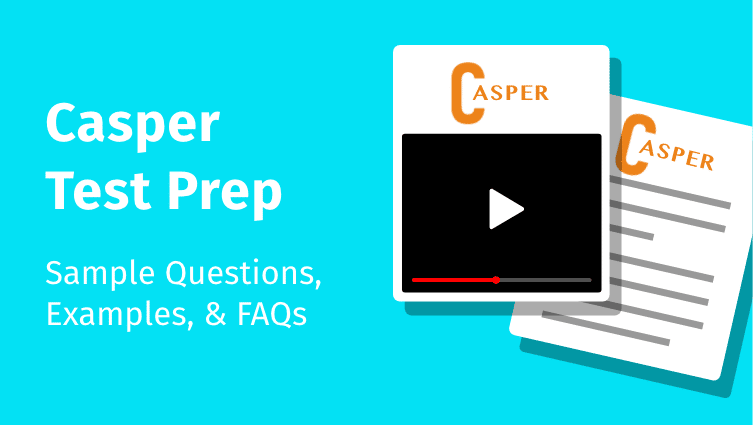
Application Prep
Casper Assessment: Prep Tips, Sample Questions, and Examples 2024-2025
If you are looking for Casper assessment practice questions and prep tips for medical and nursing programs, then you’ve come… Read more
McMaster Health Sciences Courses
For a complete guide of McMaster Health Sciences course offerings and outlines, visit this page. You can also see a complete breakdown of the required courses for Level 1 to Level 4 here.
Here are the classes you can expect in your first year (i.e. for the Fall Term and Winter Term) and tips for approaching them:
Cellular and Molecular Biology (HTHSCI 1I06 A/B) – 6 Units
HTHSCI is problem-based and less lecture-heavy. They teach you how to think critically about the processes involved in solving a problem. This will help you become an expert on a particular subject and really focus your learning.
This course is challenging, but rewarding. You’ll learn how modern research is conducted using Rapid Problem Solving Exercises (RAPSE). In these tests, you are presented with limited information and challenged to establish a reasonable hypothesis for the data.
You will also have a Tri-Partite Problem Solving Exercise (TRIPSE). This is essentially a group of RAPSEs. The TRIPSE is an open book test that simulates the modern research process. You will collaborate with approximately 4-5 of your peers to create, present, and test your hypothesis using the techniques you learned in class.
In this course, you’ll receive some of your first undergraduate marks. Don’t beat yourself up if your mark is lower than you’re used to. Talking to your teaching assistants, studying smarter, and finding ways to apply what you’ve studied to the problem can really help.
Introduction to Chemistry I (CHEM 1A03) – 3 Units
Chemistry 1A03 covers basic chemical processes, some of which you likely learned in your Grade 11 and 12 chemistry courses.
The material you learn in this class will be important for your future courses, so make sure you keep up with the readings and attend class.
REMEMBER: Practice makes perfect. Stick with it and you will have a great experience in the course.
Introduction to Chemistry II (CHEM 1AA3) – 3 Units
Chemistry 1AA3 builds upon the knowledge you acquired in CHEM 1A03.
You will be introduced to some organic chemistry, which can be daunting for most students. When it comes to organic chemistry, follow the same rule as in the first half of the course—practice, practice, practice. Take good notes and don’t be afraid to ask for help.
You can also ask for past tests to help you prepare. These will help you get a feel for the material and get comfortable with the type of questions that will be asked of you.
Inquiry I: Introduction (HTHSCI 1E06 A/B) – 6 Units
Inquiry I is unlike anything you’ve ever experienced before. You might be slightly confused after your first class. Don’t worry, this is completely normal.
Be patient, keep up with your reflection writing, and you will make it through.
Interdisciplinary Problem-Solving in Health Sciences (HTHSCI 1G02) – 2 Units
This course is designed to teach you how to use interdisciplinary approaches to health. It will help you with your problem solving skills, using different disciplines to address problems, and communication skills.
Praxis Pathways I (HTHSCI 1X01 A/B) – 1 Unit
This course replaced Collaboration and Peer Tutoring. Praxis Pathways gives you the chance to learn important skills like leadership, collaboration, reflection, information literacy, and critical analytical skills.
Introduction to Health and Safety (WHMIS 1A00) – 1 Course
This course is an online evaluation that you must complete before you are admitted into labs. Once you read over the material, they present you with a simple quiz.
This quiz will inform them that you are not going to put yourself or others in danger while in the lab.
Electives – 9 Units
Taking CHEM 1A03, HTHSCI 1I06 (Cellular and Molecular Biology), HTHSCI 1E06 (Inquiry), PHYSICS 1A03, and an elective in your first semester could be a good choice.
In your second semester, you could take courses like CHEM1AA3, HTHSCI 1I06 (Cellular and Molecular Biology), HTH1E06 (Inquiry), HTHSCI 1G03 (Psychobiology), and HTH 1DT3 (Discover Immunology Today).
COACH’S TIP: In addition to your required courses, McMaster Health Sci gives you the chance to take some electives. One of the best things you can do is to take electives you enjoy. Many students take courses that they aren’t interested in just because they heard from other people that they’re easy. No matter how easy a course might seem, it will be hard for you if you have no interest in it.
We recommend PHYSICS 1A03 because it explores the crucial fundamentals of physics. Just make sure that you attend class and do your best to keep up with the work.
HTH 1DT3 (Discover Immunology Today) is an excellent introductory course. Every week, specialists talk about their specific fields of research. This is good exposure to the field of immunology and will give you the opportunity to work with your peers and discover which field of immunology you like most.
For more tips on how to approach your classes, improve your grades, and build valuable skills that will help you during university and beyond, work 1-on-1 with a Youth Coach.
McMaster Health Sciences Student Society and Clubs
Clubs are a great way to make connections, have fun, and gain valuable, hands-on experience.
With options like the multimedia club, charity fashion show, acapella group, musical, student council, and welcome week representatives (aka Pathogens), there’s something for everyone.
Connect with your upper year mentor and talk about which one might be a good fit for you.
If you can’t find something that interests you, McMaster University has hundreds of other clubs you can join. Check out this page to see all your options!
COACH’S TIP: While you might want to join a few different clubs, don’t take on more than you can handle. Choose a couple and commit to them for the entire year.
If you can prove to the club executives that you are a great team member, they can act as references when you apply for future leadership positions.
McMaster BHSc Student Research Opportunities
A great thing about the BHSc program is that it emphasizes the importance of research.
A research position can give you valuable experience and future opportunities.
Health Sciences does not hand you a research position—you have to work for it. But, you will have many opportunities to engage with professors who can offer you these coveted positions. After all, it doesn’t hurt to ask!
Many of your BHSc courses will have guest lecturers. If you are interested in their research, connect with them about potential research opportunities.
McMaster Health Sci also has an online community where students and professors post research opportunities that you can apply to. This online forum is where many of our students found their first research opportunities.
There is no right way to go about finding a research position. Be proactive and don’t get discouraged, and you will find the right opportunity for you.
McMaster Health Sciences Tuition
Thinking about paying university tuition can be stressful.
But, for what you’re getting, the cost of McMaster Health Sciences is incredibly good value.
The estimated McMaster Health Sciences tuition (plus supplementary fees) for the 2023/2024 academic year is $7,548.45.
REMEMBER: This does not include paying for books, a food plan, residence/housing, and other associated expenses.
On the plus side, you can factor in a savings of at least $1,000 for receiving the an entrance award from Health Sciences for having an average of 94%+.
Or, if you’re a real scholar, you might receive the President’s Award, worth $2,500, for a 95%+ entrance average.
In addition to this tuition, there are a few other fees that will be added each year, including BHSc Academic Support Peer Tutoring ($2.29), BHSc Health and Wellness ($0.53), and BHSc Society Fee ($27.87).
For more information about McMaster Health Sciences tuition, financial aid, and scholarships, visit this page. They also have a fancy cost calculator you can use here.
If you’re interested in applying for scholarships, such as the Loran Award or the TD Scholarship, connect with a coach today. We have helped our students earn over $1 million in scholarships over the years!
McMaster Health Sciences Scholarships
McMaster Health Sciences does not offer scholarships to its students.
However, McMaster University as a whole awards scholarships to students upon entry.
For more information about scholarships, visit this page.
McMaster Entrance Awards
McMaster gives entrance awards to students almost exclusively based on their academic merit.
There are 2 types of entrance awards: 1) Automatic awards (no application required other than your OUAC app); and 2) Awards by application (apply for these here).
For a full list of entrance awards, visit this page.
McMaster Health Sciences Graduate Statistics
McMaster BHSc graduates have gone off to start a wide range of careers.
Around 65% of graduates continue on to pursue medicine. Visit this page to learn more about the careers that BHSc students pursue after they finish the program.
See the graph below for the full list of graduate statistics.
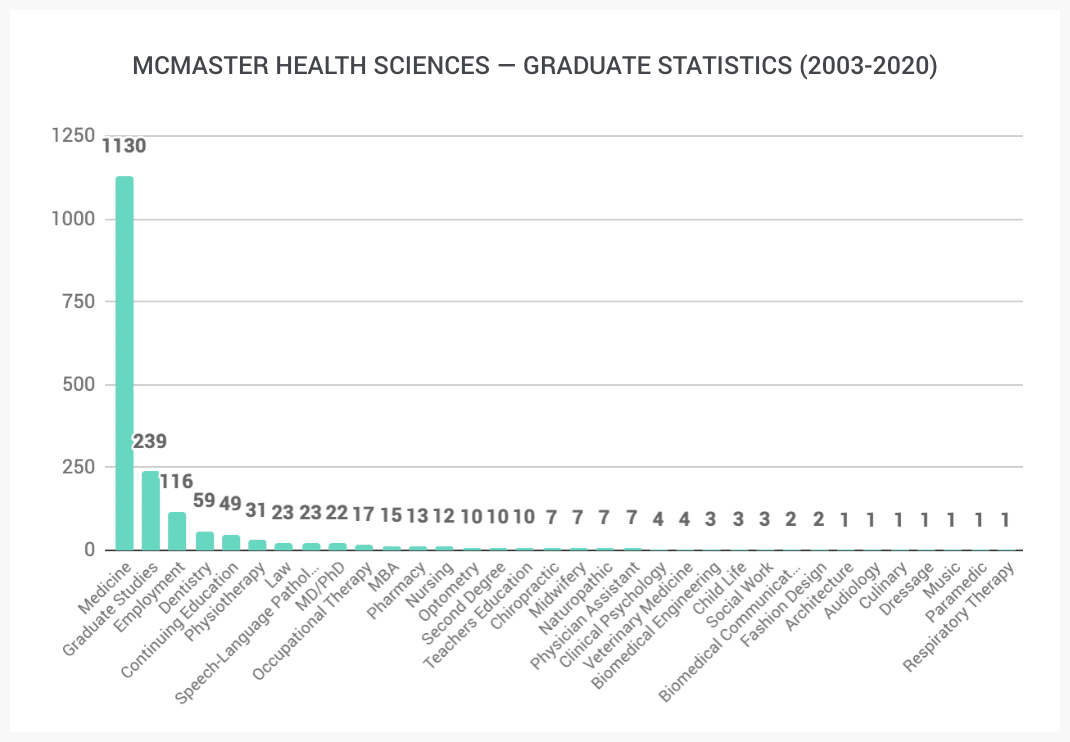
McMaster Health Sciences Professors/Faculty
McMaster Health Science is filled with knowledgeable and friendly faculty and staff. These people really make the program one of a kind.
For example, one of our Youth Coaches took an inquiry class with Professor Hartley Jafine who facilitated many engaging and valuable conversations while they explored representations of health, science, and their impact on society. This coach recalls coming away from the class with a new appreciation and understanding of how the arts intersect with health.
Many of our students tell us about their positive experiences with the Health Sciences academic advisors. It can be difficult to adjust to university or decide what career path you want. If you need some guidance, connect with the BHSc academic advisors. Our students tell us that they are extremely supportive and give students many helpful resources to guide them.
McMaster Health Sciences Gender Ratio
As far as we know, there is not a certain split between genders.
In 2019, McMaster Health Sciences reported that 75% of the Health Sciences program was female and 25% male, but there is some variance year-over-year (Fact Book).
The proportion of female students has been increasing steadily since 2016.
It’s unclear whether this is an intentional strategy of admissions, or if the total number of male applicants to the program has decreased drastically as well.
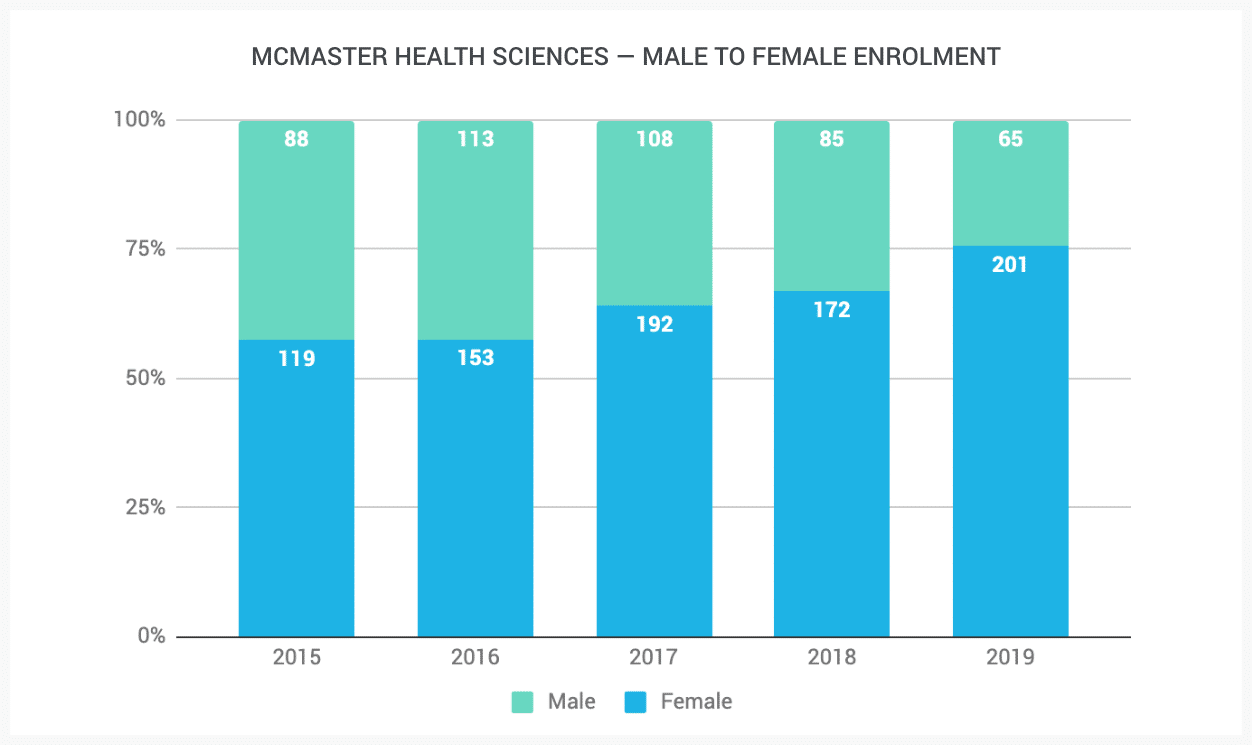
McMaster Health Sciences Contacts
Don’t be afraid to reach out to someone with questions or concerns about the program, student life, or extracurricular opportunities.
If you ever need to reach the Health Sciences office, please use the information below.
Email: bhsc@mcmaster.ca
Phone number: (905) 525-9140 ext. 22815 or ext. 22181
There’s also a great live chat you can use to get in touch with someone about the recruitment process, admissions, and your application.
This is a quick and stress-free way for you to get the information you need. 🙂
Find the mentor you’ve been looking for.
get a youth coach™
Common Questions From Students About McMaster Health Sciences
Is McMaster Health Sciences a Good Program?
McMaster Health Sciences is a top-ranked program that offers students an interdisciplinary, holistic approach to learning.
This means that, along with learning important lessons about health sciences, you will also learn transferable life skills like critical-thinking, problem-solving, and professional communication competencies.
You will also have opportunities to experience innovative inquiry-based learning models, discover health-centered careers, and work closely with your peers and professors.
McMaster Health Sciences is an excellent program because of the small class sizes, helping you make friends and connect with your peers easily.
The sense of community also makes this program one of a kind. The faculty welcomes and encourages community through the ‘BHSc Buddy’ program, in which upper year students help first years transition into undergrad.
A unique aspect of the Health Sciences is the flexibility of the program.
Because you can take many electives, you will have an opportunity to pursue your passions and interests, diversifying your undergrad experience and getting a well-rounded education. Some students choose to focus on a particular area such as Biochemistry, while others pursue a minor in another discipline. These electives are great because they allow you to explore your other interests along with health sciences.
Finally, BHSc provides you with the unique experience of being admitted to the anatomy lab to study and examine cadavers.
Is McMaster Health Sciences Hard?
A lot of students tell us that one of the hardest parts of the McMaster Health Sciences program is getting used to the inquiry-based style of learning, which is new for most.
While there is no clear answer whether McMaster Health Sciences is hard, some students struggle with the concept of having unclear directions or having to get materials by themselves. Other students have a hard time with the grading systems, working in groups, or the competitive atmosphere.
Learning to adapt to all types of situations, reaching out for help when you need it, and having confidence in your abilities can help ensure that you do well in the program (we can help with all of these areas!).
These adversities that every BHSc student struggles will grant you with the best learning experiences. A great thing about the program is that if you work hard, reflect on your learning, and effectively collaborate with others, you will be rewarded for your efforts.
To learn about ways that you can improve your critical thinking skills, leadership skills, essay writing abilities, and more, get in touch with a Youth Coach.
What Would You Change About the Program?
Our McMaster BHSc Youth Coaches, most of which are program alumni, say that this program has given them many learning opportunities that they wouldn’t have received in any other program.
However, like any program, there are a couple of things they might change. A few alumni say that most of their peers were exceptional people, but there were also some hyper-competitive students who made life stressful at times.
Our advice is to remember not to compare yourself to others because it can make you doubt yourself and your abilities. Be confident in the skills you have to offer and do your best to show them off.
What’s McMaster BHSc’s Approach to Learning (Andragogy)?
McMaster Health Sciences uses an inquiry-based approach to learning, where students think about questions and come up with compelling answers.
Usually, when you enter university you are taking classes with hundreds of other students, and then class sizes decrease in your third and fourth year.
Sitting in classes for 2-3 hours is often ineffective because we cannot pay attention and retain information for that long.
McMaster BHSc does the opposite. Students begin with small classes (of around 20 students), and instead of long lectures and note taking, they are asked to think about problems, do research, and find an answer to the question they’re given. Some students love this approach to learning, others don’t.
This method of learning teaches time management, problem solving, and critical thinking, while effectively applying what you have learned.
You Might Also Like
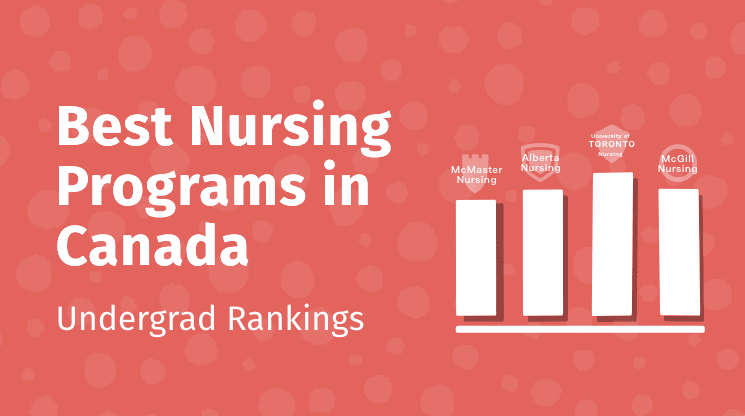
Rankings & Lists
Best Nursing Schools in Canada 2024 (Undergraduate Programs)
You’re investing a TON of time, money, and energy towards your future. You’ve gotten the grades, done a bunch of… Read more
McMaster BHSc vs. Other Programs
While this guide discusses Health Sciences specifically, we strongly encourage you to select an undergraduate program that will interest you for 4 years.
You only get to experience undergrad once, and you might be surprised by how your interests or priorities change over time.
Here is how McMaster Health Sciences compares to other programs out there.
McMaster Health Sciences (BHSc) vs. Western Medical Sciences
Western Medical Sciences (MedSci) takes a more traditional approach to learning — you will sit in lectures, attend labs, and take exams.
After your first year, you are NOT guaranteed admission into the Bachelor of Medical Sciences program (BMS) as you must maintain an average of 80%.
There are approximately 800 students admitted into Western MedSci each year (vs. McMaster BHSc with approximately 240 students). This doesn’t facilitate a close environment. Many students become overwhelmed by the MedSci atmosphere and do not continue pursuing medicine.
McMaster Health Sciences, on the other hand, has smaller class sizes and an inquiry-based approach to learning, which focuses on independent research and discussion. While this program is highly competitive, students are supportive and willing to help one another.
If you want a more traditional style of learning, then Western Medical Sciences may be the program for you. But, if you are open to a new style of learning and want a close-knit community, then McMaster Health Sciences is probably better.
To learn more about Western Medical Sciences, visit this page.
McMaster Health Sciences (BHSc) vs. University of Toronto Life Sciences
Choosing between these schools is difficult because both are very different.
The University of Toronto is in the heart of Toronto and has many undergraduate satellite campuses. Living downtown will provide you with access to the best hospitals and research labs.
U of T Life Sciences offers a wide scope on science and the opportunity to specialize in your second year. With thousands of students being admitted into Life Sciences, many get lost in the crowd.
At McMaster, there are great research opportunities and you will be a part of a community. If you live in the GTA and must live at home then, U of T might not be a bad choice. However, the philosophies behind these programs are vastly different. If you have the financial freedom to attend McMaster and are seeking new learning opportunities, we would recommend that choose the McMaster BHSc program.
To learn more about University of Toronto Life Sciences, visit this page.
McMaster Health Sciences (BHSc) vs. McMaster Life Sciences
McMaster Life Sciences offers exposure to all Life Sciences, including biochemistry, cell biology, genomics, developmental biology, neurobiology, psychology, ecology, and Earth sciences.
If you want to explore all areas of science, this program might be the better choice. A potential drawback is that there are thousands of students admitted to this program every year, so you won’t get the sense of community and get to know your professors as well.
McMaster Health Sciences focuses on the human aspect of science, including human health, wellness, and diseases. Health Sciences also allows you to take more electives, create close relationships with faculty, and, with 240 students admitted each year, you’ll feel like you’re part of a community.
It also challenges you to think critically and solve problems, which you can’t always do in the large Life Sciences classes.
To learn more about McMaster Life Sciences, visit this page.
McMaster Health Sciences (BHSc) vs. McMaster Integrated Science (iSci)
McMaster’s Integrated Science (iSci) program provides students with a holistic view of many science disciplines, including math, chemistry, life sciences, physics, Earth sciences, and science literacy.
This means that you will gain experience in many disciplines rather than one, which could benefit you later.
If you want to focus specifically on human science, you should choose McMaster Health Sciences.
One of Youthfully’s students was admitted to both programs and chose McMaster iSci. This student recommends this program because you can specialize in a certain science in your second year.
However, you cannot take as many electives in McMaster iSci as you can in McMaster Health Sciences because of your mandatory course load.
If you want to see what McMaster iSci is like, you can enrol in the iSci for a day program, where you’ll be able to shadow a first year iSci student, or you can attend a workshop.
To learn more about McMaster Integrated Science, visit this page.
McMaster Health Sciences (BHSc) vs. McMaster Arts and Science
McMaster’s Arts and Science program (Art Sci) provides students with a broad-based, interdisciplinary education.
This program bridges the divide between the arts and sciences to help you expand your learning and develop your writing, speaking, and critical reasoning skills.
This program is good for those who don’t necessarily want to go into medicine, but are interested in careers in many different fields.
McMaster Health Sciences is also an interdisciplinary program that focuses on inquiry-based thinking, collaboration, and problem solving. But, it is different because it is mostly focused on health, while Art Sci teaches you about art and science.
To learn more about McMaster Arts and Science, visit this page.
McMaster Health Sciences (BHSc) vs. McMaster Integrated Biomedical Engineering & Health Sciences
McMaster’s Integrated Biomedical Engineering & Health Sciences program (iBioMed) is a fairly new interdisciplinary program that provides students with a foundation in both engineering and health sciences. This program takes 5 years to complete.
In your first year of iBioMed, you will take courses similar to what BHSc students take, such as Chemistry and Cellular and Molecular Biology.
The biggest difference between iBioMed and BHSc is that you will be required to take engineering courses AND health sciences courses.
After your first year, you must choose between pursuing a Bachelor of Engineering and Biomedical Engineering program OR a Bachelor of Health Sciences in Health, Engineering Science and Entrepreneurship.
The target enrolment for McMaster iBioMed is smaller than McMaster BHSc (140 vs. 240).
Before you decide which of these programs you prefer, take time to think about whether engineering interests you. Taking engineering courses while you take health sciences courses can be very challenging, so make sure this program is right for you.
To learn more about McMaster Integrated Biomedical Engineering & Health Sciences, visit this page.
You’ve Got a Dedicated Coach in Your Corner
For over a decade, we have worked with thousands of students to help them achieve more than they ever thought possible.
Our coaches have a strong success rate supporting students as they apply to McMaster Health Sciences (BHSc), among other top university programs.
Our 1-on-1 Youth Coaching fills that gap that most high schools miss. We can help you build self-awareness through probing questions and assessments, set bigger goals to elevate your extracurriculars and future career plans, and improve skills that matter on supplementary applications, such as interviewing, written communication, critical thinking, and creativity.
We use a coaching methodology, called ‘full student’ development, that’s been proven to increase your chances of admission to top-tier universities and obtaining competitive jobs/internships.
So, what are you waiting for? Fulfill your post-secondary potential with the mentorship and coaching you’ve always wanted! 🙂
IMPORTANT: Want to share information and/or images from this resource on your own website, blog, article, etc.? Please ensure you reference content of any kind published by Youthfully Inc., in whole or in part, using the following statement: (1) Our Organization (Youthfully Inc.); (2) The title of our content/resource; and (3) the URL to our webpage where the content was originally posted. For example: “Sourced from: Youthfully Inc., ‘McMaster Health Sciences (BHSc): The Definitive Guide for Applicants (2024)’, https://youthfully.com/mcmaster-health-sciences-bhsc-guide/.”
Not doing so is an infringement of copyright and is illegal. We spend significant time developing resources for students, so please take a few seconds to ensure they are referenced properly.
DISCLAIMER: While the information in this blog is considered to be true and correct at the date of publication, and although our team makes every attempt to ensure that the information is accurate and vetted by university staff, Youthfully is not in any way liable for the accuracy of any information printed and stored or in any way interpreted and used by a user.
Application
About McMaster BHSc
Common Questions
McMaster BHSc vs. Others
Get 1-on-1 Support

